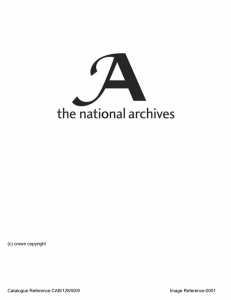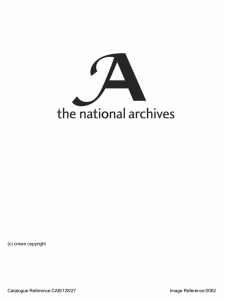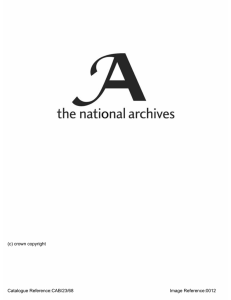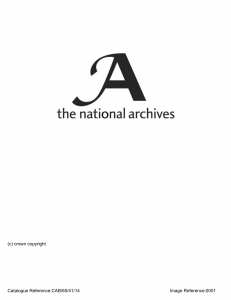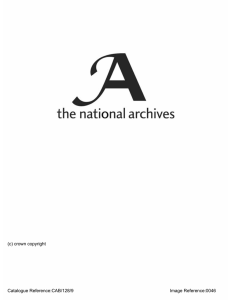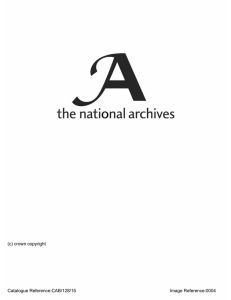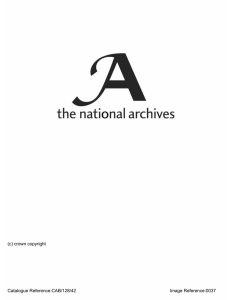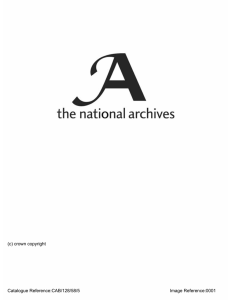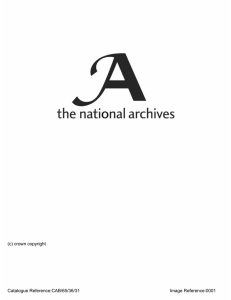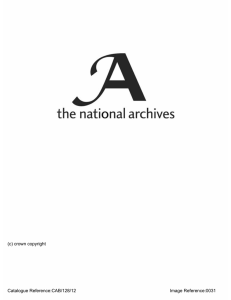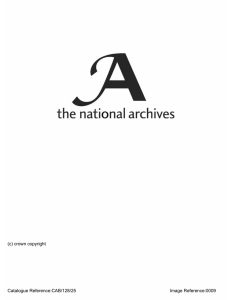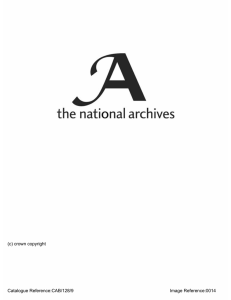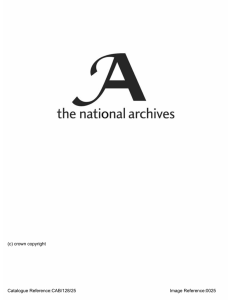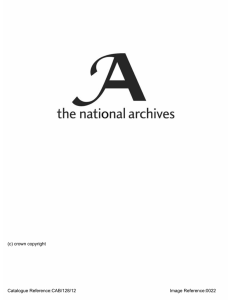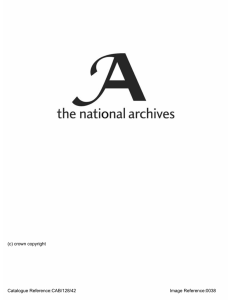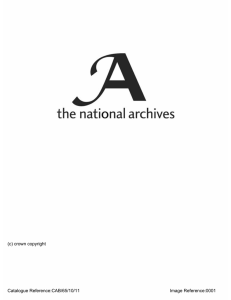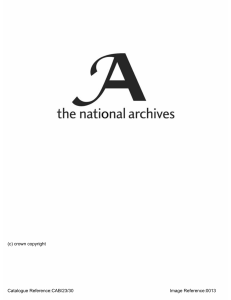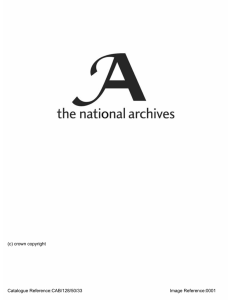(c) crown copyright Catalogue Reference:CAB/65/36/30 Image Reference:0001
advertisement
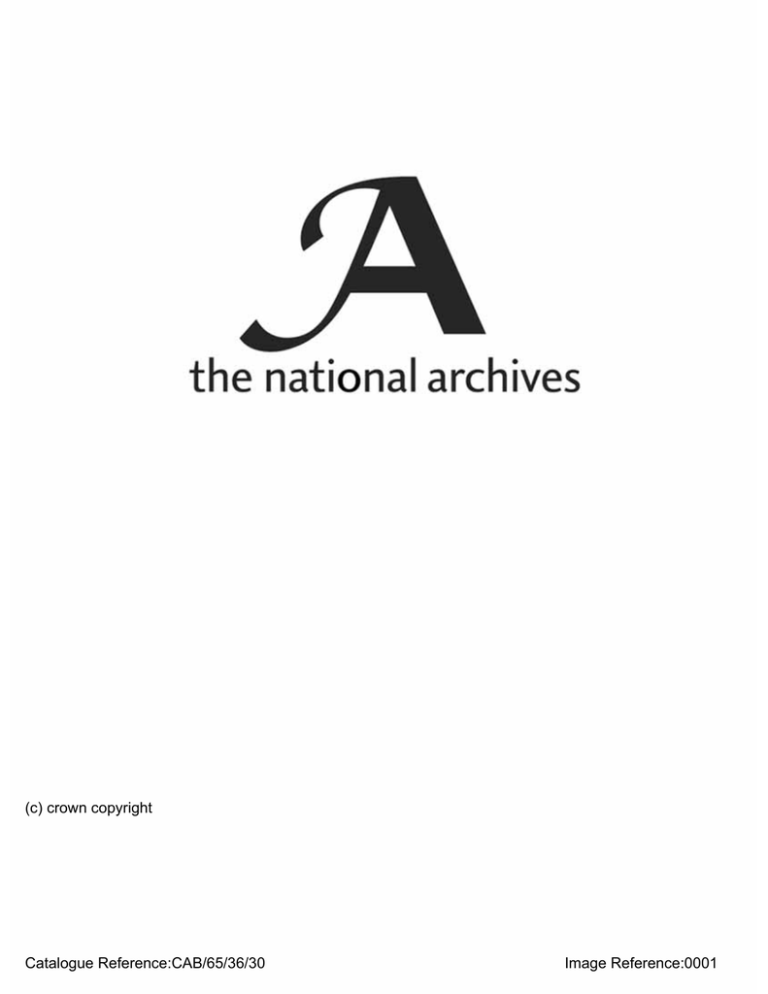
(c) crown copyright Catalogue Reference:CAB/65/36/30 Image Reference:0001 T H I S D O C U M E N T IS T H E P R O P E R T Y O F H I S B R I T A N N I C M A J E S T Y ' S Printed for the War Cabinet. GOVERNMENT November 1943. SECRET. ! Copy No. O . W . M . (43) 162nd Conclusions. W A R C A B I N E T 162 (43). CONCLUSIONS of a Meeting S.W. 1, on Friday, of the War Cabinet held at 10 Downing 2Qth November, 1943, at 11-30 p.m. Street, Present : The R i g h t Hon. C. R. ATTLEE, M.P., Deputy P r i m e Minister (in the Chair). The R i g h t Hon.. E R N E S T B E V I N , M . P . , Minister of Labour and National Service. The Right Hon. Sir J O H N A N D E R S O N , M.P., Chancellor of the Exchequer. T h e Right Hon. O L I V E R L Y T T E L T O N , M.P., Minister of Production. The R i g h t Hon. H E R B E R T M O R R I S O N , M.P., Secretary of State for t h e Home Department and Minister of Home Security. The R i g h t Hon. L O R D WOOLTON, Minister of Reconstruction. The following were also present The R i g h t Hon. V I S C O U N T C R A N B O R N E , Secretary of State for Dominion Affairs. The Right Hon. L O R D Lord Privy Seal. The Major Right Hon. Sir A R C H I B A L D Bt., M.P., Secretary of State for A i r . BEAVERBROOK, the R i g h t Hon. G. L L O Y D M.P., Minister of Fuel and Power. GEORGE, SINCLAIR, The Right H o n . L O R D Paymaster-General. LORD BRUNTISFIELD, Parliamentary Secretary, Admiralty (Item 1). The Right Hon. B R E N D A N B R A C K E N , M.P.. Minister of Information. Secretariat Sir Mr. EDWARD CHERWELL. : BRIDGES. NORMAN BROOK. CONTENTS. Minute No. 1 . Subject. Coal M a n - p o w e r for t h e C o a l m i n i n g 2 Eire .... T h e Kerlogue [26503] Case. Industry. Page 204 Coal. Man-Power for t h e Coalmining Industry. (Previous Reference: W . M . (43) 137th Conclusions, M i n u t e 6.) 1. The W a r Cabinet considered a Memorandum by the Lord President of the Council ( W . P . (43) 531) regarding the need for increasing the labour force in the coal-mining industry. I t was explained in the Memorandum that the plans for increasing the labour force by voluntary means had not yielded sufficient results, and it was now necessary to arrange to call up compulsorily to the coal-mines fit men of military age who would otherwise be called up for the Armed Forces. The method of applying this selective compulsion had been carefully considered by the Minister of Labour and National Service, who had reached the conclusion that the selection must be made by ballot. This conclusion had been endorsed by the Lord P r e s i d e n t s Committee. The method by which the ballot would be conducted was outlined in the Memorandum. The Parliamentary Secretary to the Admiralty said t h a t he had been asked by the F i r s t Lord to refer again to the point which he had raised when this matter had come before the Lord P r e s i d e n t s Committee, viz., whether persons who had volunteered for, and been accepted by, one of the Services before reaching the age of compulsory military service would be excluded from this ballot. The Minister of Labour and National Service said that men who were already in the Armed Forces would, of course, be excluded from the ballot, even though they had joined up as volunteers before reaching the age of compulsory military service. He could not, however, give an assurance which would have the result t h a t any person below the age of call-up could escape the ballot for the coal-mines by volunteering to join one of the A r m e d Forces. Youths who volunteered in this way were placed on a deferred list, and sometimes remained on this list for a substantial period before they were drafted into the Service by which they h a d been accepted. A t times the numbers on this deferred list were considerable; and there was likely to be discontent if all the young men in this position were automatically excluded from the ballot. H i s whole purpose was to secure a scheme which would be, and appear, fair to all; and this purpose would be defeated if the ballot could be avoided by volunteering for one of the Armed Forces before reaching the age of compulsory military service. He had already undertaken to ensure that a limited number of young men with special qualifica­ tions would be excluded from the ballot, i.e,, men who had been accepted for flying duties in the Royal A i r Force and the Fleet AirArm, or as artificers in submarines, and men in the short list of highly skilled occupations and the " Y " Scheme; and his Depart­ ment would consider w i t h the A d m i r a l t y what categories of tradesmen, & c , required for the Navy could be excluded under this head. The view of the W a r Cabinet was that the scheme outlined in the Memorandum would be acceptable to the public generally only if the basis of selection were such as to win public confidence in its i m p a r t i a l i t y ; and on this account it was essential to limit to the minimum the special classes which would be excluded from the ballot. The W a r C a b i n e t Approved the proposals outlined in W . P . (43) 531; and took note that the Minister of Labour and National Service would announce the scheme in a statement to be made in the House of Commons on Thursday, the 2nd December. N O T E . — S u b s e q u e n t t o t h e m e e t i n g it w a s s u g g e s t e d t h a t t h e r e w a s g r a v e d o u b t w h e t h e r m e n a c c e p t e d for t h e S e r v i c e s c o u l d l e g a l l y b e b r o u g h t w i t h i n t h e s c o p e of t h e b a l l o t ; a n d t h a t , for t h i s r e a s o n , i t w o u l d b e n e c e s s a r y t o p l a c e s o m e r e s t r i c t i o n s o n t h e a c c e p t a n c e b y t h e S e r v i c e s of y o u n g m e n v o l u n t e e r i n g b e f o r e r e a c h i n g t h e a g e of c o m p u l s o r y m i l i t a r y s e r v i c e . Eise. T h e Kerlogue Case. 2. The Secretary of State for Dominion Affairs reported that an E i r e ship, Kerlogue, when on her way to Spain, had been attacked on the 23rd October by British aircraft. The master and seamen of the crew had been wounded—the master seriously. This ship had been carrying a British cargo and the master had, for many years, been on service in British ships. Enquiry had shown that the vessel had been given instructions to follow a course which would take her well to the west of the Prohibited Area, but t h a t at the time the vessel was attacked she was well off her course, steering to enter the Prohibited Area, but had not entered it. We had informed the E i r e Government of the results of our enquiries into this matter, and had stated that we could not accept any liability. We had now been asked whether we would grant any ex gratia compensation to the injured members of the crew. Sir J o h n Maffey was anxious that this should be done, since it would facilitate his negotiations for the release of the remaining British airmen interned in Eire. The Secretary of State for Dominion Affairs sought the advice of the W a r Cabinet as to whether there was any political objection to making ex gratia grants in these cases. , One suggestion made in discussion was that we might dispose of the matter by giving ex gratia grants, under such conditions' that the fact t h a t we had done so would not be made public. The view of the W a r Cabinet w a s ' t h a t there was no reason why we should not make ex gratia grants openly in this case, seeing t h a t the matter arose out of a mistake, and that the ship had been engaged in carrying a British cargo at the time. Offices of the War Cabinet, S. W. 1, 2Qth November, 1943.
